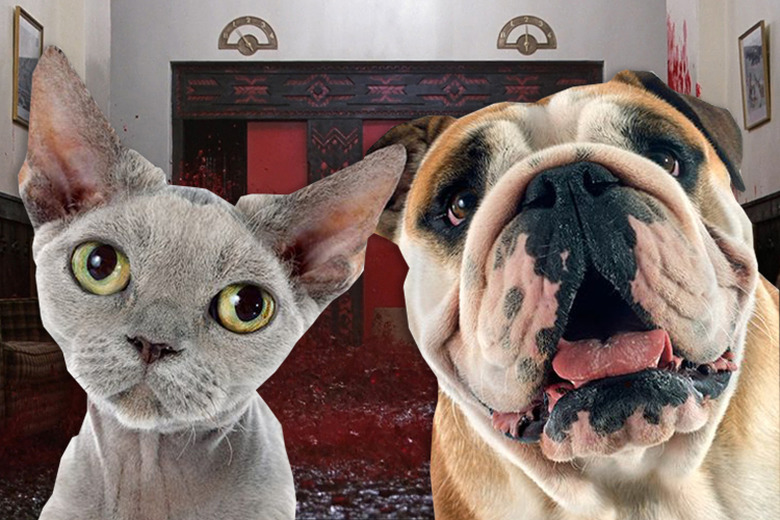Do Cats And Dogs Know When I'm On My Period?
We spend huge amounts of time with our pets, and they see us in many different emotional and physical states. But one thing that's always intrigued us: Do our pets know when we're on our periods?
Dogs definitely know something's different with you.
Dogs definitely know something's different with you.
Many people will give you a resounding "yes," when it comes to dogs. If you're a dog owner who menstruates, you likely have a gross story involving discarded feminine products. Also, women on their periods often report that dogs tend to sniff their crotches more during that time of the month. A Google search for "do dogs know when you're on your period?" turns up dozens of discussions about that very topic, with many menstruating participants arguing that yes, they do.
You probably already know that sniffing human crotches is a favorite dog pastime. Though considered rude in the human world, when dogs sniff your crotch, they are merely on a quest for information. Dogs have amazing senses of smell, with approximately 220 million sensors in their noses, compared to a paltry 5 million in humans. Their sense of smell is their primary method of gathering information. That's why dogs sniff each others' butts; doing so gives them information on the other dog's age, sex, temperament, and even diet.
MORE: What To Do When Your Dog Eats A Tampon
So, your dog might also concentrate on your nether regions as a source of information.We have higher concentrations of pheromones (which is what dogs are smelling for) in our genital and anal areas. So in a way, it's our fault.
Dogs can sniff out ovarian cancer, so it only makes sense that they'd be able to smell period blood. We asked Julie Hecht, a PhD student in animal behavior at the Graduate Center, CUNY, and the writer behind the column "Dog Spies" on Scientific American, who told us a dog's sense of smell does let them know something is up, but that doesn't mean they understand what it is.
"They know something is different down there from usual," says Hecht. "It doesn't have a meaning to them, but they can certainly detect that we would smell different."
RELATED: Can Dogs Be Gay?
This makes sense. Dogs have amazing noses, the thing is that they only understand what they're finding when they've been trained to find it.
So what about cats?
So what about cats?
Can cats — the species less likely to invade your personal space — sense that something is different when you're on your period? A Google search turned up fewer relevant results than our similar dog-based one. A Quora discussion about a pair of kittens who only bite menstruating women seems, thankfully, to be an outlier.
Mikel Delgado, a Certified Cat Behavior Consultant and a PhD candidate at UC Berkeley, isn't aware of any relevant studies, but told us that a cat's sense of smell is much better than ours.
MORE: Do Cats & Dogs Know When You're Having Sex?
"I'm sure that when we are menstruating, cats can detect olfactory changes due to hormones and menses itself," says Delgado.
Like dogs, though, that doesn't mean that cats understand what's happening, only that something smells different. Delgado even had a consulting client whose cat would only urinate on the bed when she was menstruating. "He may have thought there was an intruder in his bed!" suggests Delgado.
Conclusion
Conclusion
Both cats and dogs can smell that something is different about us, but there's no reason to think they can attach meaning to it. In other words, they know that something has changed, but they don't know what it is.
Having answered that question, let's move on to a much more important one: Can our pets be trained to pick up to-go food for us when we're on our periods? We will personally fund this study.
Always check with your veterinarian before changing your pet's diet, medication, or physical activity routines. This information is not a substitute for a vet's opinion.


